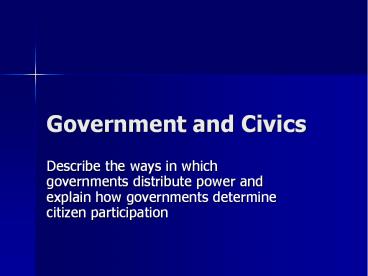Government and Civics - PowerPoint PPT Presentation
1 / 23
Title:
Government and Civics
Description:
Government and Civics Describe the ways in which governments distribute power and explain how governments determine citizen participation 1. Federal Power is shared ... – PowerPoint PPT presentation
Number of Views:174
Avg rating:3.0/5.0
Title: Government and Civics
1
Government and Civics
- Describe the ways in which governments distribute
power and explain how governments determine
citizen participation
2
1. Federal
- Power is shared by one central and several
regional authorities - EX The USA
- The federal government (Obama, Congress, Supreme
Court) is the central authority - Each state is a regional authority
3
Federation / Federal
Ways Government Distributes Power
Regional Authority
Regional Authority
Central Authority
Regional Authority
Regional Authority
4
2. Unitary
- Power is held by one central authority
- EX- North Korea is a dictatorship
- All power is held by one person (central
authority) - 0 citizen participation
5
Unitary
Ways Government Distributes Power
Regional Authority
Regional Authority
Central Authority
Regional Authority
Regional Authority
6
3. Confederation
- Less binding than a federation
- Loosely group of states (countries) that share a
common interest - Only a few powers are given to the central
authority - EX- OPEC Several countries in Middle East who
share one common interest oil
7
Confederation
Ways Government Distributes Power
Regional Authority
Regional Authority
Central Authority
Regional Authority
Regional Authority
8
Ways Government Distributes Power
All key powers are held by the central government
State/regional authorities hold most of the power
Unitary
- Federal
- Confederation
Strong central government
Weaker central government
9
How Governments Determine Citizen Participation
High Participation
High Participation
General Citizens Participation
Select Citizens Participation
Citizen Participation
Government Power
Government Power
Citizen Participation
Government Power
Low or No Participation
Low or No Participation
Low or No Participation
Oligarchic
Autocratic
- Democracy
10
4. FORMS OF GOVERNMENT SYSTEM
- Each form falls under one of the three government
systems - Federal
- Unitary
- Confederation
11
5. Autocratic
- One person possesses unlimited power
- Citizens have no participation rights
- Oldest form of power (kings, pharaoh's, etc)
- Inherit power through birth or take power by
brutal military force
12
6. Autocracy- Totalitarianism
- One leader holds power
- EX
- Adolf Hitler
- Forcibly took power
- Tried to control all aspects of citizens lives
13
7. Autocracy- Absolute Monarchy
- King, queen, or emperor
- Power inherited (passed down through family)
- EX King of Saudi Arabia
14
8. Oligarchy
- Rule by the few (very corrupt)
- Opposition is violently suppressed
- Very little (or no) citizen participation
- EX Communist China
- Power comes from either
- Military strength
- Wealth
- Religion
15
9.Democratic
- Officials are elected into office
- There are 2 forms of democracy
- Parliamentary democracy
- Presidential democracy
16
10. Parliamentary
- Executive power lies with members of a
legislature (who elect the executive leader) - Prime Minister
- Executive and legislative branches are
intertwined (the same) - EX Israel, Canada, Australia, U.K.
17
11. Presidential
- Executive and legislative branches are separated
and generally not accountable to one another - EX President Obama is the executive, Congress is
the legislature
18
12. Republic
- Elected representatives vote on legislation, not
the people - EX Kenya and South Africa
19
13. Constitutional Monarchy
- A monarch (king, queen, emperor) must follow and
make decisions based on a constitution (set of
laws) that have been approved by the people - EX Japan, Canada
20
14. Theocracy
- A government that submits to religious authority
- A religious figure (bishop, ayatollah, etc. is in
charge and makes decisions based on religious
beliefs) - EX Iran
21
15. Communist
- One party holds power
- Government makes nearly all decisions regarding
economy - No private ownership
- Class-less society
- EX China
22
16. Dictatorship
- A ruler or small group holds absolute power
- EX Sudan and Cuba
23
Social Studies terms
- Sovereignty
- Population
- Government
- Civics
- Territory
- State
- Constitution
- Culture group
- Ethnic group
- Prehistory
- Environment































